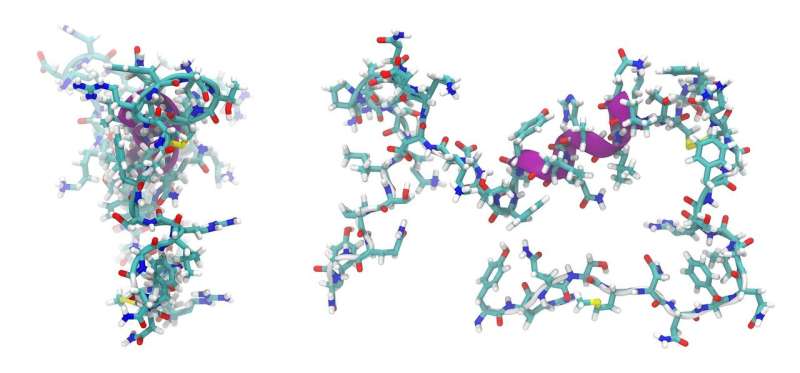Beetroot peptide as potential drug candidate for treating neurodegenerative and inflammatory diseases

MedUni Vienna's Institute of Pharmacology isolated a peptide (a small protein molecule) from beetroot. The peptide is able to inhibit a particular enzyme that is responsible for the breakdown of messenger molecules in the body. Due to its particularly stable molecular structure and pharmacological properties, the beetroot peptide may be a good candidate for development of a drug to treat certain inflammatory diseases, such as neurodegenerative and autoimmune diseases.
The peptide that occurs in the roots of beetroot plants belongs to a group of molecules that plants use inter alia as a chemical defense against pests such as bacteria, viruses or insects. "By analyzing thousands of genomic data points, our team was able to define a number of new cysteine-rich peptides and assign them phylogenetically in the plant kingdom. In this process, our attention was drawn to a possible function as so-called protease inhibitors. The beetroot peptide can therefore inhibit enzymes that digest proteins," explains Gruber.
The beetroot peptide specifically inhibits prolyl oligopeptidase (POP), which is involved in the breakdown of protein hormones in the body and is therefore able to regulate inflammatory reactions. POP is a much-discussed drug target for neurodegenerative and inflammatory diseases, such as Alzheimer's and multiple sclerosis, for example. "This means that, in future studies, this group of plant peptides called knottins, such as those found in beetroot, could potentially provide a drug candidate for treating these diseases."
Peptide can be detected in commercial beetroot juice
The peptide not only occurs in the root vegetables, but can also be detected in commercially available beetroot juice—albeit in very low concentrations. "Although beetroot counts as a very healthy vegetable, it would be unreasonable to hope that dementia could be prevented by regular consumption of beetroot," says the MedUni Vienna pharmacologist. "The peptide only occurs in very small quantities and it is not clear whether it can as such be absorbed via the gastrointestinal tract."
The research work being conducted by Gruber's laboratory develops bio-inspired drug candidates. "We are searching through large databases containing genetic information of plants and animals, decoding new types of peptide molecules and studying their structure, aiming to test them pharmacologically on enzymes or cellular receptors (such as one of the prominent drug target classes, the so-called G protein-coupled receptors) and finally analyzing them in the disease models," explains Gruber.
Potential drug candidates are chemically synthesized in a slightly modified form based on the natural product in order to obtain optimized pharmacological properties. This concept appears to be successful: A few years ago, the research team generated a drug candidate T20K for MS with a synthesized plant peptide (cyclotide), which has recently been tested successfully in a Phase 1 trial by the Swedish firm Cyxone under a MedUni Vienna license, and is now being prepared for a Phase 2 clinical trial.
More information: Bernhard Retzl et al. Discovery of a Beetroot Protease Inhibitor to Identify and Classify Plant-Derived Cystine Knot Peptides, Journal of Natural Products (2020). DOI: 10.1021/acs.jnatprod.0c00648



















